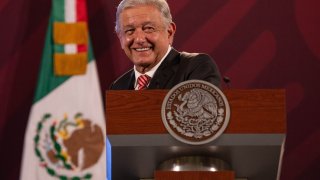Back to the Future: Mexico Reforms Its Constitution
AMLO’s twilight rush for constitutional reforms before his successor’s inauguration indicates his desire to rebuild Mexico’s one-party state, even while out of office.
The U.S. government itself also weighed in, albeit at the last minute, with its ambassador in Mexico City expressing concern about the judicial reform. Such public language, coming as the reforms neared passage, seems, however, to have been more for the record, given the concerns of the business community, rather than a serious attempt to derail AMLO’s project, especially given U.S. silence throughout his six-year term regarding his authoritarian tendencies. Unsurprisingly, AMLO reacted sharply, saying he was putting “a pause” on relations with the U.S. embassy.
In recent decades, the United States has had the luxury of largely ignoring issues of Mexican governance, except when it impinges on narcotics and immigration problems. During the long period in which PAN and PRI presidents alternated in power, Mexico could be viewed as another democracy along with Canada, its other partner under the North American Free Trade Agreement.
While the full measure of slippage from democratic norms is yet to be seen, Washington may find itself facing hard decisions about how loud to raise its voice in defense of specific affected interests such as those of U.S. businesses, U.S. citizens living in Mexico, or U.S. law enforcement. Thus, it will have to calibrate the degree to which it will accept the threat of lessened Mexican cooperation on immigration, a hot-button issue in American domestic politics.
If these constitutional reforms add up to a sustained effort to shoehorn Mexico back into the outdated model of a de facto one-party regime, we can expect significant pushback from within. Mexico has changed vastly from the country AMLO knew in the 1970s. Petroleum, which once gave the PRI seemingly endless resources, is now a much smaller part of Mexico’s economy. State oil producer PEMEX is in deep trouble as production has dropped, and AMLO has shut out new foreign investments.
A diversified economy anchored by free trade with the United States and Canada has developed. Mexican society, too, has changed with the rise of a significant middle class that is connected to the world and accustomed to a vigorous free media.
AMLO has benefited from corruption and complacency on the part of the two other major political parties, the PAN and PRI. But Sheinbaum cannot count on them remaining weak forever. Should they use their time in the wilderness to regroup and reinvigorate themselves, they may yet be in a position to challenge MORENA’s dominance in a country that may be far less tolerant of any effort to suborn independent institutions.
Thus, Mexico’s new president will have to tread carefully and decide how far she is prepared to go in implementing AMLO’s effort to return Mexico to its past. She may face pressure from him and his MORENA supporters to use her powers to the maximum. But she should not underestimate the dangers of igniting tensions both internally and with Mexico’s giant northern neighbor.
Richard M. Sanders is a Senior Fellow, Western Hemisphere at the Center for the National Interest. A former member of the Senior Foreign Service of the U.S. Department of State, he served at embassies throughout Latin America and in positions in Washington dealing with the region.
Image: Octavio Hoyas / Shutterstock.com.

